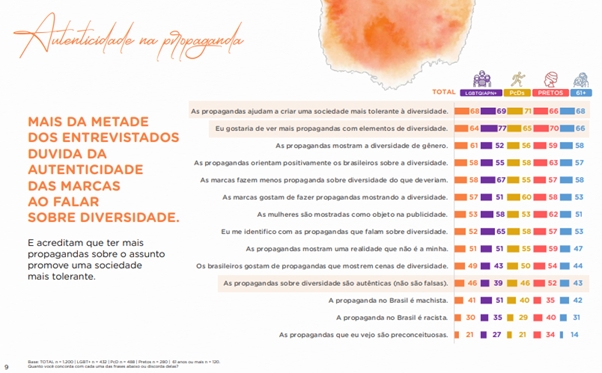Over the years, diversity has been used more and more in advertisements and publicity actions. But do Brazilians really believe that brands are being truthful? According to data from Olddiversity, a study carried out by Grupo Croma, more than half of those interviewed doubt the authenticity of brands when talking about diversity. 64% of respondents stated that they would like to see more advertisements with elements of diversity. In recent years we have noticed that the number of black people, gays and people with disabilities have gained more prominence both in advertising and in the national and international media.
For Edmar Bulla, CEO of the Croma group and creator of the study, including different elements and effectively representing diversity in advertisements highlights everyday diversity, which is natural and should be valued. Brands can play an important role in deconstructing stereotypes, prejudices and discrimination.
But the numbers are still worrying when we talk about machismo and racism in advertising: 41% of those interviewed declare that Brazilian advertising is sexist and 53% say that women are still used as objects. Three in ten Brazilians participating in the study say that advertising in the country is racist and among black people, this perception is even greater (40%).
“This demand is even more latent for LGBT+, who in the study have the highest rate of association in relation to the machismo attribute in advertising. Black people also yearn for more representation, being the public that most considers propaganda to be racist and prejudiced”, explains the expert.
A large majority believes that advertisements help create a society that is more tolerant of diversity, addressing real, everyday issues facing Brazilians. 68% of people who participated in the study agree with this statement and 51% say that they show a reality that is not theirs. About responsibility Edmar Bulla emphasizes that brands therefore have a great opportunity and responsibility to show Brazilian diversity in their advertisements, providing a more authentic and positive representation of different social groups that make up our society.
Finally, the study reveals that 64% of Brazilians would like to see more advertising films, campaigns and actions with elements of diversity, highlighting that Brazil is a continental, plural country and that brands are aware of this need and the clamor of Brazilians adults who declare themselves asexual, lesbian, gay, bisexual and transgender, which, according to IBGE, currently number 19 million people, 12% of the country’s total population.
Photo: Disclosure/ Oldiversity
“Observing campaigns like this, we see a tendency to reach more and more audiences, showing respect and appreciation for all types of diversity. This is closely related to what a large part of the public wants to see and consume. Still, the change in attitude has to go beyond advertising campaigns, but it is important to recognize that, perhaps, some positive transformations are already happening”, concludes Bulla.
Follow Adnews on Instagram e LinkedIn. #WhereTransformationHappens





